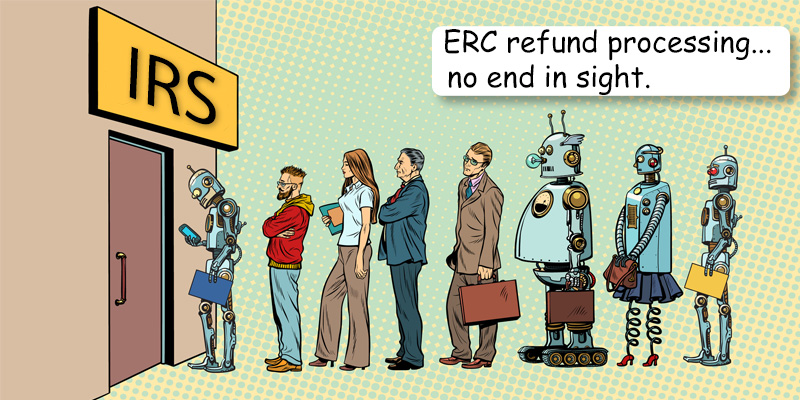Many businesses are leaving valuable payroll tax credits unclaimed, missing out on significant financial benefits. Programs like the Work Opportunity Tax Credit (WOTC), Federal Empowerment Zone (FEZ) Credits and Research and Development (R&D) credit offer substantial savings, yet they often go overlooked due to lack of awareness or resources. Here’s a closer look at these credits and how your business can capitalize on them: Work Opportunity Tax Credit (WOTC) Since its introduction in 1996, the WOTC incentivizes hiring from specific groups, such as veterans, long-term unemployed and individuals receiving government assistance. The Department of Labor estimates that one in five…
Posts published in “Tax Credit”
Each year in January, the Taxpayer Advocate Service (TAS) presents its annual report to Congress, consisting of a summary of the ten most serious problems encountered by taxpayers each year. It may not be any surprise to those waiting for their Employee Retention Tax Credit (ERC) refund, but the most serious problems reported for this year are the IRS delays, inefficiencies and lack of transparency in their processing of these claims. Created in 1996 by Congress, the TAS is an independent organization within the IRS; their job is to ensure that every taxpayer is treated fairly under the Taxpayer Bill…
There is a fair amount of activity with the IRS-processing Employee Retention (Tax) Credit (ERC) refunds with two announcements this past month. I would call it good news for those who have legitimate claims and bad news for those who filed a not-so-legitimate claim. Actually, not all bad news for the not-so-legitimate claim group. The IRS has reopened the Voluntary Disclosure Program (VDP), which will run through November 22, 2024. As you may recall, this was started earlier this year whereby the IRS allowed you to revoke your claim and return any funds you believe were improperly claimed, keeping 20%…
Multiple lawsuits have been filed against the IRS, alleging that their lengthy processing time for ERC claims is violating their rights, including one to stop the moratorium that was imposed on new filings made after September 14, 2023. In recent IRS responses to these lawsuits, we have learned new information on how they intend to clear their backlog of 1.4+ million returns they have had as of May 18, 2024. 880,000 of those returns were filed before the moratorium on September 14, 2023, so in essence, the fact there is a moratorium at all, those returns received after that date…
They say timing is everything, and if there were ever a time to implement a 401(k) plan, the time is now. We first wrote about the Secure Act 2.0, in this post back in February 2023, a short time after it was signed into law by President Biden. One of the best parts of this act is that the government wants to give business owners money to start a plan AND even better, they want to give you money to give to your employees. This is accomplished in three different tax credits to small business owners, as covered below. Let’s…
Unlike the Employee Retention Tax Credit (ERC) that came about as the result of COVID-19 and its effect on businesses, the Workforce Opportunity Tax Credit (WOTC) has been around since 1996. It only took ERC about two years to gain popularity, but almost three decades later, the WOTC is still mostly unknown. So what exactly is the WOTC and how can it benefit your business? I am glad you asked. It is a federal tax credit ranging from $2,400 to $9,600 per hire, available to employers who hire workers from a ‘targeted group.’ These are workers who may otherwise face…
Last December, President Trump signed the Consolidated Appropriations Act of 2021, which included $1.4 trillion to fund the government through fiscal year 2021, as well as a number of important tax provisions. One of the little-known and under-utilized benefits in that Act is the extension of the Work Opportunity Tax Credit (WOTC) through December 2025. The WOTC provides a general business tax credit of up to $9,600 to employers that hire and retain individuals from certain targeted groups, such as veterans, ex-felons, summer youth, SSI recipients, long term unemployed and more. This month, the Internal Revenue Service even reminded employers…
If you are a business that started after February 15, 2020, you, unfortunately, discovered that there was not much government support available to you. The Paycheck Protection Program (PPP), the Employee Retention Tax Credit (ERC) and other help were only available to businesses that started prior to that date, reason being that the government figured that you knew what you were getting into if you started after that date, therefore, you did not need any relief. On March 11, 2021, President Biden signed the American Rescue Plan (ARP) Act of 2021, which extended support to existing businesses and also included…
While I do not necessarily write about benefits for individuals, this one happens to affect the employer, or should I say, their previous employer, which could be you. The ARP Act allows involuntarily terminated employees under Subtitle F – Preserving Health Benefits For Workers to receive premium assistance on their COBRA. The premium assistance is in the form of 100% paid for health insurance for the separated employee and their dependents for the coverage period beginning April 1 to September 30, 2021. Newly terminated employees just entering eligibility for COBRA are eligible for the premium assistance, as well as those…
The Families First Coronavirus Response Act (FFCRA) was the first COVID-19 Act passed by Congress on March 18, 2020. Back then, the belief was that COVID-19 would be a short-lived inconvenience where an employee may need to take a couple weeks off from work, and this Act was to allow them that benefit without cost to the employer. Here we are, a year later, still feeling the effects. The Consolidated Appropriations Act (CAA) 2021, passed on December 27, 2020, extended this federal paid leave until March 31, 2021, and we now find further extension and expansion in the recently-passed American…










